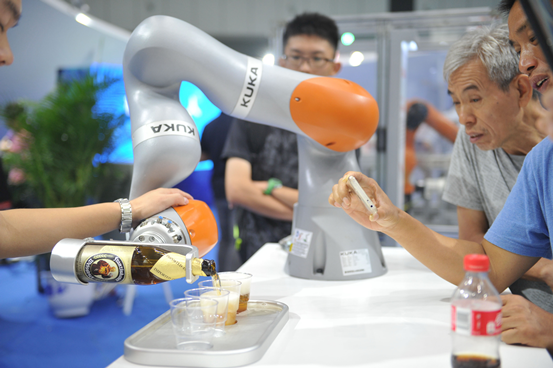04/06/2021 Source: newsgd.com
Share:
Zhang Kaiji, Secretary of the Party Leadership Group and Director-General of the Development and Reform Bureau of Foshan Municipal Government, Director of the Guangdong-Hong Kong-Macao Greater Bay Area Affairs Office of Foshan Municipal Government.
Foshan, a manufacturing powerhouse in the Pearl River Delta, is now aiming to strengthen its ties with its neighbour Guangzhou and planning to build Foshan Sanlongwan Advanced Technology and Innovation Cluster a paradigm of the urban integration in Guangdong-Hong Kong-Macao Greater Bay Area (GBA), said a senior official.
These remarks were delivered by Zhang Kaiji, Secretary of the Party Leadership Group and Director-General of the Development and Reform Bureau of Foshan Municipal Government, Director of the Guangdong-Hong Kong-Macao Greater Bay Area Affairs Office of Foshan Municipal Government, in an exclusive interview with Southcn.com and Newsgd.com, sharing his opinion on Foshan's role and future plans regarding the development of the GBA.
Sanlongwan Advanced Technology and Innovation Cluster. (File photo)
Pilot zone to enhance connections with Guangzhou
As mentioned in the outline development plan for the GBA, Guangzhou and Foshan will strengthen their cooperation and act as a locus to further enhance coordination in regional development. This means Foshan will take on some significant responsibilities, said Zhang.
Zhang indicated that Foshan has proposed that based on previous experience, Foshan-Guangzhou cooperation should be further strengthened with a focus on GBA construction, including infrastructural connectivity, furthering industrial collaboration, cooperation in sci-tech innovation, as well as environmental protection and services for the people.
One important part of the plan is to establish a Guangzhou-Foshan Pilot zone. The planning of the Sanlongwan Advanced Technology and Innovation Cluster is a key move that has been decided by the CPC Foshan Committee and Foshan Government, aiming to boost the transformation and upgrade of the city’s manufacturing industry and improve its ability to innovate.
The cluster has an area of over 90 square kilometers, located between Chanchen, Nanhai and Shunde. It will be a key innovation platform connecting with Guangzhou-Shenzhen-Hong Kong-Macao Sci-tech Innovation Corridor.
With Guangzhou South Railway Station at the center, the demonstration zone will have a radius of 10 kilometers and includes Guangzhou Higher Education Mega City, Tanzhou International Convention and Exhibition Center, Foshan Sanlongwan Advanced Technology and Innovation Cluster, and the headquarters of Midea and Country Garden.

Robotic products made by KUKA. (File photo)
"2+2+4" project to boost upgrade in manufacturing
In regards to Foshan's efforts on transformation and upgrade of manufacturing industry, Zhang introduced that the city will initiate a special plan named the "2+2+4" project, in order to build several industrial clusters, 2 valued at 10 trillion yuan, 2 at 500 billion yuan and 4 at 300 billion yuan.
The two 10-trillion-yuan industrial clusters will focus on equipment manufacturing and the ‘smart home’ industry.
In the last few years, the city has worked hard to integrate its manufacturing industry with internet, big data and AI technologies, to accelerate the expansion of the digital economy. The Midea Group, a Fortune 500 company, is working with German robotics company KUKA to upgrade its manufacturing processes.
At the same time, Foshan is also considering how to cultivate emerging industries, such as new-energy vehicles and hydrogen energy.

Foshan New Town, a platform to enhance connections with Guangzhou. (File photo)
Deepen cooperation with Hong Kong and Macao
According to the outline development plan for the GBA, Foshan will also further its cooperation with Hong Kong and Macao. According to Zhang, Foshan has established a "Hong Kong+Foshan" cooperation mechanism to facilitate cooperation in tourism, culture and professional services. In future, cooperation between the two cities will be deepened in terms of finance, trade, sci-tech R&D and so on.
Meanwhile, a similar mechanism will be established between Foshan and Macao to promote cooperation in trade, culture, innovation and entrepreneurship.
Moreover, preferential policies in terms of transportation, start-ups and housing will be implemented to attract more Hong Kong and Macao youths to relocate to Foshan. Furthermore Zhang said that a subsidy of up to 10,000 Yuan per month will be offered to qualified talent to cover the cost of rail travel between Foshan, Hong Kong and Macao. Talent seemed to meet the necessary criterion will have opportunities to enjoy a start-up fund of up to 4.5 million Yuan and a housing subsidy of up to 10,000 Yuan per month for 3 consecutive years.